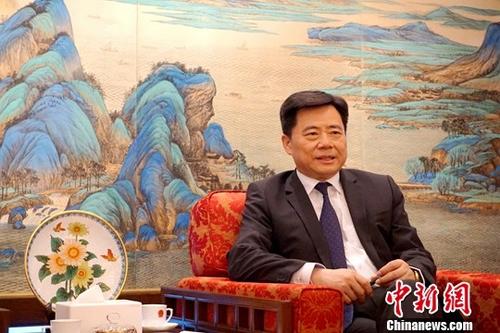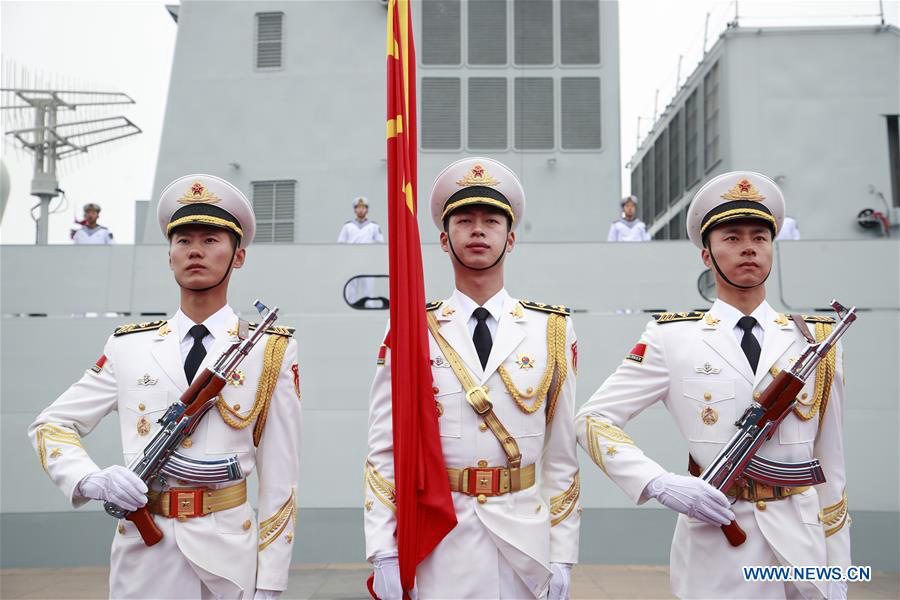


Wu Ken (Photo/Chinanews.com)
The Belt and Road Initiative (BRI) should be regarded as the most significant peace project today rather than a geopolitical tool, Chinese ambassador to Germany Wu Ken said during a recent interview with influential German newspaper Frankfurter Allgemeine Sonntagszeitung, China News Service reported on May 6.
The BRI is an initiative for economic cooperation, Wu said, stressing that the BRI is open, inclusive, and transparent, while all participants in the joint construction of the BRI are equal partners.
When asked about concerns that China's financial support for various projects may cause some countries to fall into debt, Wu explained that debt is a neutral concept which results from multiple causes.
It's only been six years since China first proposed the BRI and intensified its investment in the global market, said Wu, adding that the debt of some countries cannot be directly attributed to China.
According to statistics from the Philippines, the country's debt to China only accounts for 0.65 percent of the country's total. Wu continued that Sri Lanka's debt to China is merely 10 percent of its total foreign deficit, far less than what the country owes to other countries and international organizations.
As to the topic, "only Chinese enterprises can profit from the infrastructure projects in countries along the BRI," Wu explained that as the initiator and advocator of the BRI, China has invested enormous capital in the initiative during its first few years.
Over a month ago, German technology giant Siemens signed cooperation documents with the Chinese government on joint BRI contribution, intending to take part in BRI projects together with Chinese companies, said Wu.
London-based Standard Chartered Bank will provide at least $20 billion in financial support for projects under the framework of the BRI by the end of 2020, disclosed Wu, adding that U.S. conglomerate General Electric has received orders for equipment worth $2.3 billion through the BRI.
"Obviously, every participant in the BRI can profit from cooperation under the BRI," said Wu, pointing out that Germany has invested a total of over 80 billion euros in China, while Chinese investment in Germany only totals 11 billion euros.
When asked about the relationship between China's telecommunication giant Huawei and the Chinese government, Wu said it cannot be closer than the relationship between Volkswagen and the German government.
"Huawei is an independent private enterprise," said Wu, noting that the government of German state Lower Saxony holds 20 percent of Volkswagen shares, while the Chinese government doesn't have any shares in Huawei.
"We should think about how to bring forward the tradition of sound cooperation between China and Germany, rather than repeatedly discuss institutional differences," said Wu.
According to the ambassador, the bilateral trade volume between China and Germany reached nearly 200 billion euros last year. Meanwhile, about 1.5 million Chinese tourists visited Germany, with around 100 direct flights per week linking the two countries.
"This was all beyond imagination when I first came to Germany more than 30 years ago. Therefore, I'm full of confidence for the future relationship between China and Germany," said Wu.
 Spring scenery of Nanjing, E China
Spring scenery of Nanjing, E China People paint eggs to celebrate Easter in Prague
People paint eggs to celebrate Easter in Prague Military music display held for Chinese navy's 70th anniversary
Military music display held for Chinese navy's 70th anniversary Naval parade staged to mark PLA Navy's 70th founding
Naval parade staged to mark PLA Navy's 70th founding  Highlights of firing flintlocks at Easter in Croatia
Highlights of firing flintlocks at Easter in Croatia Didonghe Tiankeng in Hanzhong, NW China's Shaanxi
Didonghe Tiankeng in Hanzhong, NW China's Shaanxi Encho-en garden, one of biggest full-scaled Chinese-style garden in Japan
Encho-en garden, one of biggest full-scaled Chinese-style garden in Japan Beijing Int'l Horticultural Exhibition to kick off on April 29
Beijing Int'l Horticultural Exhibition to kick off on April 29 Farm work across China
Farm work across China Top 10 most sustainable cities in China
Top 10 most sustainable cities in China Top 10 European patent applicants in 2016
Top 10 European patent applicants in 2016 The power of 'She' in China
The power of 'She' in China Seven most beautiful art museums in China
Seven most beautiful art museums in China No interference in Venezuelan issues
No interference in Venezuelan issues
 Biz prepares for trade spat
Biz prepares for trade spat
 Broadcasting Continent
Broadcasting Continent Australia wins Chinese CEOs as US loses
Australia wins Chinese CEOs as US loses
Day|Week